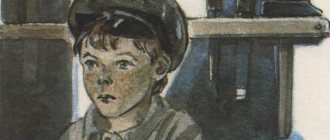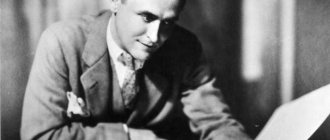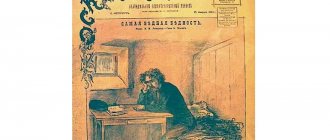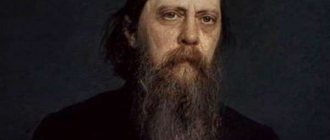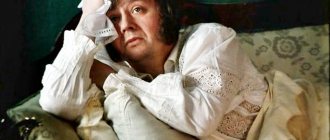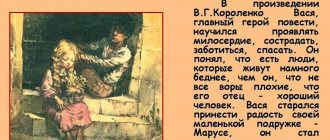In 1898, the Russian writer-playwright Anton Pavlovich Chekhov, whose “Little Trilogy” opened a new topic reflecting the life of a certain part of Russian society, set out to continue his research. The topic promised to be quite extensive and the writer gave it the name “case”. Isolation, isolation, “one’s own world,” in which there is no place for other people, these are the characteristic signs of a “man in a case.”
Chekhov's "Little Trilogy", history of creation
According to researchers of the great writer’s work, the idea of the trilogy was suggested to him by Lev Nikolaevich Tolstoy. Anton Chekhov, whose “Little Trilogy” became the “first swallow,” intended to create a whole series of works about the peculiarities of the “case life” of people, but he managed to write only three stories, after which the writer became disillusioned with his creative aspirations. He spoke about the state of his soul in the following way: “You don’t want to write, you write as if you’re talking about boring, insipid, lean food, without taste or smell...”
Meaning
The main idea of the story “About Love” is that man is by nature cowardly and cannot dare to do what he really wants. The characters in the story allowed external circumstances to overpower their internal feelings. In the name of prejudice, they abandoned the most sacred and personal that a person can have. Just mutual feelings are not enough for happiness; this also requires actions and the absence of many questions that people ask themselves, thereby depriving themselves of their own happiness.
And the main idea is contained in the words spoken by Alekhine himself:
I realized that when you love, then in your reasoning about this love you need to proceed from the highest, from something more important than happiness or unhappiness, sin or virtue in their current sense, or you don’t need to reason at all.
"Man in a Case"
“On the edge of the village of Mironositsky, in the hay barn of the elder Prokofy, the late hunters settled down for the night...” This is how Anton Chekhov’s story “The Man in a Case” begins. These hunters were Burkin and Ivan Chimsha-Himalayan. Having settled comfortably on the hay, the friends started talking. I didn’t want to sleep, and Burkin began to tell the story of his colleague, Greek teacher Belikov.
Strange Belikov
Strange Belikov always wore a coat insulated with cotton wool, galoshes and an umbrella. He walked like this at any time of the year, including in the summer. The teacher carefully packed his personal belongings in special cases and cases. He put his watch, penknife, and snuffbox into boxes that he always carried with him. Such unusual actions of an educated and not yet old man were explained by his desire to protect himself from the influence of the external environment, he reasoned like this: “...what if something like this happens...”.
Belikov systematically created his defense, and the whole city made fun of the unlucky teacher, considering his quirks a sign of mild madness. But since he was a good teacher, the performance of high school students in his subject was not satisfactory, so they did not touch him. Belikov lived alone and was afraid to get married, otherwise his wife would have to be put in a case.
But then a new teacher came to the gymnasium - a teacher of geography and history, Mikhail Kovalenko. He recently arrived in the city with his sister, Varenka, a charming person of less than thirty years old, a smiling fidget. The entire gymnasium was captivated by Varenka’s cheerful disposition, and Belikov did not escape this fate. He even began to sometimes walk with a young woman, and while walking, he proved to her with a gloomy look that “marriage is an extremely serious thing.” Varenka did not listen to him very carefully, and soon she was completely tired of his moralizing.
One day Belikov met Misha Kovalenko and Varenka when they were riding bicycles. Looking out of his case, he saw two happy free people, and the whole world turned upside down for him. The shocked Belikov came to Kovalenko’s house the next day, wanting to prove how unreasonable it is to ride a bicycle, indecent and dangerous, ugly and humiliating. Varenka was not at home, but Mikhail took his colleague down the stairs.
And then Varenka came up. She laughed merrily when she saw Belikov tumbling down the steps. And he was so shocked by what happened that he barely made it home and fell ill. He was ill for a month and died of mental illness. At the funeral, everyone wished him “the kingdom of heaven,” but thought to themselves: “Well, finally the man received a real case that will now protect him from any troubles.”
Gooseberry
Chekhov's "Little Trilogy" contains another story about the "case" life of a common man. One day Burkin and Ivan Ivanovich Chimsha-Himalayan, walking along the field, decided to visit their friend, Pavel Konstantinovich Alekhine. He warmly greeted old acquaintances and invited them to the garden. Friends sat among the overgrown gooseberry bushes, and Chimsha-Himalayan told the story of his brother Nikolai Ivanovich.
The hero of the story, from the age of nineteen, worked in the government department for a small salary and barely made ends meet. And like any financially strapped person, he had a dream. Nikolai Ivanovich wanted to have his own estate, a good house, and most importantly, gooseberries growing in the garden. It’s not that he liked jam from ripe berries, but he just dreamed about it. The years passed, and all the time the gooseberry bushes stood before the official’s eyes. In order to someday buy an estate, Nikolai Ivanovich saved every penny; often he had nothing to eat, he put all the money in a box and hid it in a hiding place.
When the time came to start a family, Nikolai Ivanovich wooed a widow, rich and very ugly, with a bad character. Besides, she was almost twenty years older than him. They did not hold a wedding - for reasons of economy, and Nikolai Ivanovich put all his wife’s money in the bank. They lived from hand to mouth, wore whatever they could find, and did not give birth to children. The woman soon died from such a life.
Briefcase for a vocabulary student
"Man in a Case"
Feature film (1939)
Animated film (1983)
Additionally:
- “Forgotten Life” / Capitanova L.A. A.P. Chekhov in life and work: A textbook for schools, gymnasiums, lyceums and colleges. - M.: Russian Word, 2002.
- “Man in a Case” / Russian literature of the 19th–20th centuries: In two volumes. T. 1: Russian literature of the 19th century: A textbook for applicants to universities. - M.: Publishing house Moscow. un-ta. 2001.
- “Man in a Case” / History of Russian literature of the 11th–19th centuries: Textbook for universities. - M.: Russian Word, 2001.
- “Man in a Case” / Works of A.P. Chekhov: A Manual for Teachers. - M.: State educational and pedagogical publishing house of the Ministry of Education of the RSFSR, 1956.
- Notes to the text / Chekhov A.P. Selected works. - M.: Fiction, 1988.
- “Man in a Case” / Unified State Examination 2009: Literature: Reference book. - M.: Eksmo, 2009.
- “Man in a Case” / We write essays based on the stories of A.P. Chekhov. - M.: Gramotey, 2008.
- Ideological and artistic analysis of the story by A.P. Chekhov “Man in a Case” / Matyushenko L.I., Matyushenko A.G. A textbook on the history of Russian literature of the 19th century. - M.: MAX Press, 2009.
"Gooseberry"
Feature film (1967)
Additionally:
- “Gooseberry” / History of Russian literature of the 11th–19th centuries: Textbook for universities. - M.: Russian Word, 2001.
- “Gooseberry” / Unified State Exam 2009: Literature: Reference book. - M.: Eksmo, 2009.
- “Gooseberry” / We write essays based on the stories of A.P. Chekhov. - M.: Gramotey, 2008.
- Notes to the text / Chekhov A.P. Selected works. - M.: Fiction, 1988.
"About love"
M.G.Kachurin, D.K.Motolskaya “Russian literature”. Textbook for 9th grade of secondary school. - M., Education, 1988, p. 308 –311
Protest against the “case” life. Chekhov's stories of the 90s amaze with the capacity of their content and the scale of artistic generalizations. These are three stories written in 1898: “The Man in a Case”, “Gooseberry”, “About Love”. They are connected by a common idea, plot, characters, and therefore are called a “little trilogy.” The main idea of the trilogy is associated with the image of a teacher who is ridiculous with his fear of life, his desire to hide both his things and himself in cases: “He wore dark glasses , sweatshirt, stuffed his ears with cotton wool, and when he got on the cab, he ordered the top to be raised.” He also tried to hide his thoughts in a case. “For him, only circulars and newspaper articles were clear in which something was prohibited.” Belikov’s painful fear, however, poisons the social atmosphere and becomes an active force. A frightened, trembling creature, like Shchedrin’s minnow, has been holding in its hands not only the gymnasium for fifteen years, but the entire city! Belikov himself does not understand this. He just repeats: “No matter what happens,” sighs, whines, and even walks around the teachers’ apartments “and seems to be looking out for something. He’ll sit like that, silently, for an hour or two and leave. He called this “maintaining good relations with comrades.” But in a country where police investigation, denunciation, and judicial reprisals reigned, where living thoughts and good feelings were persecuted, the mere sight of Belikov was enough to make those around him tremble. Thus, under the influence of the “man in a case,” complicity with everything vile breeds, everything living, kind, and honest freezes: “They are afraid to speak loudly, send letters, read books, are afraid to help the poor, teach them to read and write...” Behind the figure of Belikov we see Belikovism - a typical phenomenon of social life in Russia in the 80s and 90s of the last century and a characteristic feature of slave psychology in general. The name of Chekhov's hero became a household name, like the names of Khlestakov, Chichikov, Judushka Golovlev. Belikov died solely from fear of life, and burying him was “a great pleasure,” as the narrator of this story, teacher Burkin, admitted. But the death of the Greek teacher could not rid the city of Belikovism. Even after his funeral, life remained the same as it was - “not circularly prohibited, but not completely permitted.” Nevertheless, the story does not leave a feeling of hopelessness. It also depicts forces hostile to Belikovism. This is the democratic teacher Kovalenko. He openly opposes the “case” vegetation: “I don’t understand... how you digest this fiscal, this vile face. Eh, gentlemen, how can you live here! The atmosphere here is suffocating and disgusting. Are you teachers? You are bureaucrats, you don’t have a temple of science, but a deanery council, and it stinks of sourness, like a police box.” In this rebuke, one can hear the angry intonations of Shchedrin’s satire. And Burkin, Belikov’s colleague, although, unlike Kovalenko, avoids any conclusions and assessments of a political nature (his usual caution is evident) and tries to explain Belikov’s life by the peculiarities of his character, nevertheless he depicts Belikovism as a grave social evil. Burkin’s words sound like a muted protest against spiritual oppression, a hidden longing for a clean, free social atmosphere: “Ah, freedom, freedom. Even a hint, even a faint hope of its possibility gives the soul wings, doesn’t it?” The listener of Burkina, the old veterinarian Ivan Ivanovich Chimsha-Himalayan, openly hates Belikovism. He talks about another “case man” - his brother Nikolai Ivanovich (“Gooseberry”). This is a man who, more than anything in the world, wanted to acquire a piece of land and eat “not bought, but his own gooseberries.” Nikolai Ivanovich did the boring job of a petty official for many years. He married for money, drove his wife to the grave with his stinginess and, at the cost of long hardships, bought an estate in his old age. He is finally enjoying his own gooseberries, he is overfed, fat, and “he’s about to grunt into the blanket.” The newly-minted landowner, who was once afraid even to have his own views in the treasury chamber, has acquired “the most impudent conceit”, pronounces “only truths and in such a tone, like a minister...”. At the same time, Nikolai Ivanovich imagined himself as a benefactor of the peasants: he treats them of all diseases with castor oil and soda, on his name day he gives them half a bucket of vodka, and the drunks shout “Hurray”, bowing at the master’s feet. Ivan Ivanovich talks about his brother with mockery, anger and melancholy . He says: “A person needs not three arshins of land, not an estate, but the entire globe, all of nature, where in the open space he could demonstrate all the properties and characteristics of his free spirit.” About broken happiness, about how “quiet, “sad love,” and the whole life of a sweet, intelligent person, says Chekhov in the story “About Love.” The hero of this story - the landowner Alekhine, a good and intelligent man - has fallen down and is mired in petty household chores. Alekhine's motives were noble: he devoted himself to caring for the estate not for the purpose of acquisition, but in order to pay off his father's debts. But household chores become another option for a case. The life of the hero of the story, closed in the circle of agricultural commerce, loses its meaning. He himself dies spiritually and unwittingly ruins the life of a charming woman, Anna Alekseevna. They love each other tenderly, devotedly, as if they were made for each other. Anna Alekseevna is married, but her husband, a good-natured and at the same time limited, reactionary-minded man, is alien to her. However, Alekhine has nowhere - not in the everyday, but in the moral sense - to invite his beloved woman with him. “She would follow me, but where? Where could I take her? It would be a different matter if I had a beautiful, interesting life,” he argues, “if I, for example, fought for the liberation of my homeland or was a famous scientist, artist, painter, otherwise I would have to captivate her from one ordinary, everyday environment.” to another, the same or even more everyday.” In the world of the Belikovs there is no room for living human aspirations. All stories lead the sensitive reader to the inevitable conclusion, sounded in the words of Ivan Ivanovich: “Seeing and listening to how they lie... and they call you a fool because you tolerate this lie; endure insults, humiliation, do not dare to openly declare that you are on the side of honest, free people, and lie yourself, smile, and all this because of a piece of bread, because of a warm corner, because of some bureaucrat who is penniless price - no, it’s impossible to live like this anymore!” The trilogy, like other Chekhov stories of the 90s, calls the reader to an active, spiritually rich life.
A dream come true
Nikolai Ivanovich acquired a small estate with stunted trees in the garden and lived for his own pleasure. First of all, he bought twenty gooseberry bushes and planted them all around. Then he started a lawsuit with a nearby plant, which, in his opinion, was poisoning the air, and as a result the gooseberries did not grow. The legal proceedings were endless and ruinous for Nikolai Ivanovich. And yet he felt like a happy man when he went out into the garden in the morning and looked at the gooseberry bushes.
Two months later, Nikolai Ivanovich fell ill and was diagnosed with stomach cancer. Poor nutrition for many years, nervous disorders, insomnia - all this took its toll. When he could no longer get out of bed, and death was about to occur, the servants brought a full plate of ripe gooseberries into the room. Nikolai Ivanovich didn’t even look at him.
About love
And finally, Chekhov’s “Little Trilogy” ends with a story about love. It started raining in the morning. Pavel Konstantinovich Alekhine invited his friends Ivan Chimsha-Gimalaysky and Burkin, who had been visiting him since yesterday, to breakfast. Over coffee and liqueur, a conversation began about this and that, and Alekhine told his friends a love story that happened to him in his youth.
Once Pavel Konstantinovich was elected district judge as an educated man who knew languages and was well versed in jurisprudence. In court, he met the deputy chairman, Dmitry Luganovich, and good friendly relations arose between them. Once, after an intricate trial that lasted two days in a row, when everyone was pretty tired, Luganovich invited Alekhine to dinner at his home.
This is how Pavel Konstantinovich met Anna Alekseevna, Luganovich’s wife, a young woman of twenty-two years old, intelligent and beautiful. He immediately felt a kindred spirit in Anna. At dinner they talked about various trifles, had fun, all three understood each other perfectly, as if they had known each other for many years. Alekhine noticed that there was complete mutual understanding between the spouses, and was quite surprised by this, since Anna Alekseevna, with her sophistication and deep inner culture, was head and shoulders above the simple and superficial Dmitry Luganovich.
That same day, Pavel Konstantinovich realized that Anna occupied all his thoughts, he tried to remember her every word, every look. Then he had no idea that the young woman was also in slight confusion after Alekhine took his leave and went to his home. Invisible threads stretched between them, connecting their souls.
Since then, Alekhine began to often visit the Luganovich family, became friends with them and tried in every possible way to be useful. Dmitry and Anna also did not remain in debt; they offered to help with money when Pavel Konstantinovich experienced difficulties in paying off debts left over from his father. But something else was important to him; he wanted to see Anna’s shining eyes every minute, hear her voice, and be with her.
Both were already in love with each other, but each understood that it was impossible to give vent to feelings, it would make everyone around them unhappy and ultimately destroy the Luganovich family and the life of Alekhine himself. We had to restrain ourselves; neither Pavel Konstantinovich nor Anna allowed love to break free, they kept it in a strong case.
And only once, when Anna Alekseevna was leaving for Crimea for treatment, Alekhine, finding himself alone in a train compartment with her, was able to hug his beloved woman and kiss her. She answered him, shedding tears, the lovers spent several happy minutes together and then parted forever.
Composition
As for the structure, this work is not the same as for most stories. The peculiarity of the composition is that “About Love” is written using the “story within a story” technique. That is, at the very beginning, the reader sees a friendly conversation and a discussion of the fact that the beautiful Pelagia is in love with the cook Nikanor, who, in their opinion, is completely unsuitable for her, then there is a discussion about love, and then, accordingly, the story of the main character Alekhine about his love feelings.
- The beginning of his story is an invitation to dinner from Luganovich and an acquaintance with his young wife, Anna Alekseevna.
- The climax is the mutual feeling that arose between Alyokhin and Anna Alekseevna and the awareness of the absolute impossibility of confessing to each other and starting a relationship.
- The denouement is a tragic, sad and emotional farewell of the heroes on the train on which Anna Alekseevna is leaving forever.
